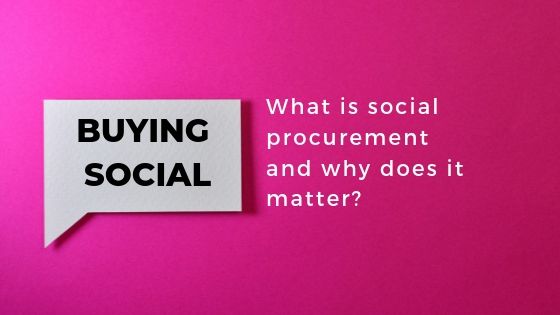There has been a huge shift in focus over the last few years towards consideration of social and environment aspects in procurement, rather than just the traditional economic or financial focus.
It comes down to a few reasons. First, social procurement has become a key part of the Government agenda with policies such as the Indigenous Procurement Policy (IPP) and the Victorian Government’s Social Procurement Framework introduced just last year. Both of these policies seek to embed social procurement into Government departments and agencies.
But more importantly, organisations realise the value of social procurement in helping them achieve their broader business goals and gain a much-needed competitive advantage.
So, what exactly is social procurement and why does it matter to organisations today?
Social procurement puts an organisation’s purchasing power to work to deliver social value, above and beyond the value of the goods or services being procured.
That social value could be reducing inequalities, creating job opportunities for under-represented groups, or reinvigorating marginalised communities – all by using money that would have been spent anyway.
There are lots of different ways to approach social procurement. Essentially, it comes down to engaging a diverse range of groups in the supply chain, such as Indigenous businesses, social enterprises, Australian Disability Enterprises (ADEs), businesses owned by women, and more.
Let’s face it, with nearly 20,000 social enterprises and approximately 12,000 Indigenous businesses operating in Australia, it’s never been easier for organisations to focus on social procurement and create a positive impact on society.
Benefits of Social Procurement
The decision to buy from social enterprises can deliver huge benefits to individuals and communities, as well as the organisation and employees. As Australia Post says in its recent report:
“We believe an increased focus in procurement on society and the environment is one of the greatest opportunities to create economic, social and environmental value.”
The benefits include:
1. Enhanced business reputation.
Research on ‘Corporate Procurement in Australia’ by Social Traders found that businesses were choosing social buying because it enhanced their reputation amongst staff, shareholders and customers. This can lead to real revenue growth – the 2017 Cone Communications CSR study found that 87% of consumers would purchase a product because the company advocates for an issue they care about.
2. Inspires employees and attracts talent
Social procurement engenders pride and contributes to the attraction and retention of talent. This is especially important for the next generations of workers. Millennials expect their employers to behave ethically and sustainably, with nearly one in five willing to sacrifice more than 40% of their salary to work for a responsible employer. Supply chains provide employers with one of the greatest areas for impact.
3. Gain a competitive advantage
The integration of corporate social responsibility into the procurement process is a great brand story, helping businesses gain a competitive edge. Companies can also win new business and tenders as a direct result of increasing their social focus and delivery of benefits to society or the environment.
4. Creates synergies with community programs
By combining social procurement with other corporate social programs, businesses can increase impact in both areas.
5. Works towards a sustainable economy
Social procurement helps the transition towards a more sustainable growth economy. It allows organisations to create deeper connections with communities and makes sure those communities benefit from the organisation. You’re enabling social enterprises to create more jobs and grow their enterprises to create even more impact in the communities they operate within. It’s estimated that for every $100K spent on social procurement, 1.5 jobs are created for disadvantaged Australians.
6. Introduces innovation
More diverse suppliers can have a track record of innovation that can add real value to your organisation and supply chain. Essentially, diversity introduces a number of different experiences and backgrounds into your supplier mix to shake up homogenous thinking with fresh new perspectives. For example, as a company that relies on constant innovation, Google has a vested interest in working with a diverse group of small, unique suppliers.
Next steps
The concept might seem simple, but it’s not always easy to put social procurement to work. This requires a different mindset to traditional procurement, as it considers social and environmental outcomes, as well as value for money. There’s also a gap in what Indigenous enterprises and social enterprises can provide in terms of goods and services.
In our next Social Buying article, we’ll explore the challenges and steps you can take to introduce social buying into your organisation.







